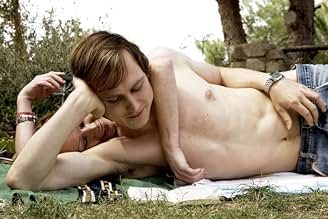IMDb RATING
6.6/10
4.2K
YOUR RATING
While on a Mediterranean vacation, a seemingly happy boyfriend and girlfriend find their connection to one another tested as they bond with another couple.While on a Mediterranean vacation, a seemingly happy boyfriend and girlfriend find their connection to one another tested as they bond with another couple.While on a Mediterranean vacation, a seemingly happy boyfriend and girlfriend find their connection to one another tested as they bond with another couple.
- Awards
- 7 wins & 19 nominations total
- Director
- Writer
- All cast & crew
- Production, box office & more at IMDbPro
Featured reviews
long review in making. saw this tonite nov 4 2010. Its a little too much chick oriented to me and became boring and kind of vague. its a good movie and a great sophomore effort by the director but some of the scenes just dragged on. If she dislike him so much why did she marry him?? why did he put up with the constant haranguing??? why did he not do more with his work? the married couple is unbelievable and unpleasant. this film has phenomenal 90 percent on rotten tomatoes and 6.6 on IMDb. the 66 out of 100 is my personal feeling. the ending had a real lack of resolution and for much of the movie nothing was happening.
German director Ade's 'Everyone Else' (or 'All the Others' -- 'Alle Anderen') is very much a women's picture -- in the very most positive sense.. Her story might be the kind Jane Austen would write if she lived today, when a young couple must learn about each other by living together -- but with the old problem of weighing themselves and their values against other people's and theirs. Ade focuses on the relationship between a young architect and his publicity agent girlfriend as they think about how to be together as a couple while spending the summer at his parents' villa on the island of Sardinia. Wonderfully natural acting by the two principals as well as action that shows off the mercurial twists in man-woman roles through day-to-day events make this film continually interesting to watch even though it lacks big dramatic payoffs. But when the calibration is subtle, as with Jane Austen, little matters like buying a dress or deciding what to carry on a hike become matters from which much is to be learned.
Gitti (Birgit Minichmayr) and Chris (Lars Eidinger) seem to have a lot of fun together. Gitti shows her eccentricity when she tells the little daughter of visiting friends to be up front if she doesn't like her. She even lets the girl pretend to shoot her, then does a mock death and falls into the pool. Chris seems a little insecure about himself; his talent as an architect has yet to pay off; he's uncertain about a competition he's entered, and Gitti is worried that he's a little wimpy. Perhaps to be more assertive, he insists they spend time with his fellow architect Hans (Hans-Jochen Wagner) and pregnant wife Sana (Nicole Marischka), whom he'd initially avoided, switching gears and now considering them as potential role models. Eventually Chris acknowledges this wasn't such a good idea; that he and Gitti are happier and better off being who they are. Though there's a somewhat failed hiking expedition, and Chris (off-camera) meets with a promising local client and his future suddenly brightens up, it's primarily the couple's weighing themselves against the seemingly more fortunate pair that embodies the film's life lesson.
The quirky redhead Gitti, given to fits of laughing, has insecurities too. She doesn't like it when she asks Chris if he loves her and he answers only by kissing her. She's continually afraid he may stop loving her. Both of them in fact are in love and grateful that they ever met. This is unusual in being about a happy couple, who are not headed toward tragedy or betrayal or other dramas. But the screenplay is nothing if not proof that "happy" isn't any more a fixed reality than "confident" or "grown-up." There isn't much more to the action than that, but it's all in the details as Ade spins out one scene after another in which Eidinger and Minichmayr run through a range of emotions together.
Some male viewers of this two-hour film find it self-indulgent and interminable. There's little doubt that the second evening spent with Hans and Sana doesn't have to be allowed to run so long to make clear they're bores, and the film could have done with some trimming. It also seems that Gitti's moodiness is allowed to go too far; you begin to wonder if she may need help. However when one thinks of how natural and real the two actors are throughout, it's impossible not to conclude that Ade is doing something right, and has trod familiar paths but avoided cliché. She just needs to develop more faith in the value of the cutting room.
Seen as part of the New York Film Festival at Lincoln Center 2009.
Gitti (Birgit Minichmayr) and Chris (Lars Eidinger) seem to have a lot of fun together. Gitti shows her eccentricity when she tells the little daughter of visiting friends to be up front if she doesn't like her. She even lets the girl pretend to shoot her, then does a mock death and falls into the pool. Chris seems a little insecure about himself; his talent as an architect has yet to pay off; he's uncertain about a competition he's entered, and Gitti is worried that he's a little wimpy. Perhaps to be more assertive, he insists they spend time with his fellow architect Hans (Hans-Jochen Wagner) and pregnant wife Sana (Nicole Marischka), whom he'd initially avoided, switching gears and now considering them as potential role models. Eventually Chris acknowledges this wasn't such a good idea; that he and Gitti are happier and better off being who they are. Though there's a somewhat failed hiking expedition, and Chris (off-camera) meets with a promising local client and his future suddenly brightens up, it's primarily the couple's weighing themselves against the seemingly more fortunate pair that embodies the film's life lesson.
The quirky redhead Gitti, given to fits of laughing, has insecurities too. She doesn't like it when she asks Chris if he loves her and he answers only by kissing her. She's continually afraid he may stop loving her. Both of them in fact are in love and grateful that they ever met. This is unusual in being about a happy couple, who are not headed toward tragedy or betrayal or other dramas. But the screenplay is nothing if not proof that "happy" isn't any more a fixed reality than "confident" or "grown-up." There isn't much more to the action than that, but it's all in the details as Ade spins out one scene after another in which Eidinger and Minichmayr run through a range of emotions together.
Some male viewers of this two-hour film find it self-indulgent and interminable. There's little doubt that the second evening spent with Hans and Sana doesn't have to be allowed to run so long to make clear they're bores, and the film could have done with some trimming. It also seems that Gitti's moodiness is allowed to go too far; you begin to wonder if she may need help. However when one thinks of how natural and real the two actors are throughout, it's impossible not to conclude that Ade is doing something right, and has trod familiar paths but avoided cliché. She just needs to develop more faith in the value of the cutting room.
Seen as part of the New York Film Festival at Lincoln Center 2009.
The thinking is too obvious. Get a couple of well built people to talk for two hours, with some (uninspiring) nudity thrown in and no one has to find too much money to produce something that looks like a movie. There are so many film festivals, one of them is bound to play it.
Fraulein Minichmayr is lively enough and she's been in some real films (Downfall, Perfume)so her first scene with the little girl holds hope - "Tell me why you think I'm so awful." Co star Eidinger as an architect offers a chance for some comment on taste and style which fail to impress.
Production values are in the competent unimpressive bracket.
It was the end of the Sydney Film Festival but this was not the movie to offer an audience which had just been blackjacked with the ridiculous Ming-liang Tsai VISAGE. Have they no mercy? Even film festival subscribers deserve pity.
Fraulein Minichmayr is lively enough and she's been in some real films (Downfall, Perfume)so her first scene with the little girl holds hope - "Tell me why you think I'm so awful." Co star Eidinger as an architect offers a chance for some comment on taste and style which fail to impress.
Production values are in the competent unimpressive bracket.
It was the end of the Sydney Film Festival but this was not the movie to offer an audience which had just been blackjacked with the ridiculous Ming-liang Tsai VISAGE. Have they no mercy? Even film festival subscribers deserve pity.
great actors, smart dialogs and a very precise observations of a young professional society in Germany. one of the best German films in a long time made by a director who knows how to direct great actors. people who like theatre will love this movie. when i went to this movie i expected a German version of a french movie from directors like francois ozon. i also expected it to be a typical movie made from a woman for women. still i expected a lot because the actors count to the best ones of German theatre. the movie did not turn out the way i expected it. the questions it raises about creative achievers who want to stay independent, free and young are shameless and razor sharp. every scene is observed very precisely without seeming to be constructed. gitty (birgit minichmayr) might not be as strong as many might hope but she never looses the main focus of this movie: authenticity
Similar in style and tone to last year's "Blue Valentine," the German film "Everyone Else" provides us with an oblique look at a troubled relationship. Though the couple in this film does not seem as overtly unhappy as the one in the American work, there is still something clearly eating away at their relationship. The most admirable aspect of the screenplay by Maren Ade is that it doesn't throw easy labels onto either the characters or the problems they're facing. The movie is really more a piece of objective reportage chronicling their lives over the course of a few days than a plot- and theme-driven narrative leading us to a preordained conclusion about them as people.
Chris (Lars Eidinger) is a gifted but apparently not very successful architect, while Gitti (Birgit Minichmayr), his girlfriend, who works in the recording business, seems to be generally supportive of his efforts. Chris and Gitti are spending a relaxing vacation at his mother's home on the Mediterranean, when Gitti begins to off-handedly question Chris's masculinity (we assume that it has more to do with his lack of initiative and drive than with his personal mannerisms). In response, Chris begins to treat Gitti in an ever more callous fashion, trying to prove her wrong by acting in the dismissive and domineering way he assumes "real" men do, and in the way, if Gitta is any indication, women apparently want them to.
But this synopsis really only covers the tip of the iceberg, for there are clearly many more complex dynamics taking place within this relationship that are not so easily delineated and described. Suffice it to say that the movie explores the myriad elements that go into relationships, and does so without spelling them out in simplistic terms and without passing judgment on the characters. The parameters within which any relationship must be set are still evolving and fluid in the case of Chris and Gitti, and this leads to much pushing of the boundaries and behavioral experimentation on the part of the couple throughout the course of the film. Ade's direction is unobtrusive and observational in nature, which allows the actors to interact with one another in a quasi-improvisational and thus wholly believable fashion.
There is, however, a definite downside to this type of storytelling – "Blue Valentine" suffered from it as well – and that is that the motivations for the characters' actions are often so murky and inexplicable that they can seem downright arbitrary to those of us who are watching all of this unfold from the outside in. That's why Chris and Gitti strike us as being more weird and annoying – if not downright daffy - than anything else at times.
Thus, your initial response might be to assume that perhaps Chris and Gitti simply aren't meant for one another and that they might think about looking elsewhere for a relationship. But, then again, if it were that easy to get out of a troubled relationship, we'd have no need in the first place for films like "Everyone Else."
Chris (Lars Eidinger) is a gifted but apparently not very successful architect, while Gitti (Birgit Minichmayr), his girlfriend, who works in the recording business, seems to be generally supportive of his efforts. Chris and Gitti are spending a relaxing vacation at his mother's home on the Mediterranean, when Gitti begins to off-handedly question Chris's masculinity (we assume that it has more to do with his lack of initiative and drive than with his personal mannerisms). In response, Chris begins to treat Gitti in an ever more callous fashion, trying to prove her wrong by acting in the dismissive and domineering way he assumes "real" men do, and in the way, if Gitta is any indication, women apparently want them to.
But this synopsis really only covers the tip of the iceberg, for there are clearly many more complex dynamics taking place within this relationship that are not so easily delineated and described. Suffice it to say that the movie explores the myriad elements that go into relationships, and does so without spelling them out in simplistic terms and without passing judgment on the characters. The parameters within which any relationship must be set are still evolving and fluid in the case of Chris and Gitti, and this leads to much pushing of the boundaries and behavioral experimentation on the part of the couple throughout the course of the film. Ade's direction is unobtrusive and observational in nature, which allows the actors to interact with one another in a quasi-improvisational and thus wholly believable fashion.
There is, however, a definite downside to this type of storytelling – "Blue Valentine" suffered from it as well – and that is that the motivations for the characters' actions are often so murky and inexplicable that they can seem downright arbitrary to those of us who are watching all of this unfold from the outside in. That's why Chris and Gitti strike us as being more weird and annoying – if not downright daffy - than anything else at times.
Thus, your initial response might be to assume that perhaps Chris and Gitti simply aren't meant for one another and that they might think about looking elsewhere for a relationship. But, then again, if it were that easy to get out of a troubled relationship, we'd have no need in the first place for films like "Everyone Else."
Did you know
- SoundtracksTo All The Girls I've Loved Before
Written by Albert Hammond and Hal David
Performed by Julio Iglesias and Willie Nelson
- How long is Everyone Else?Powered by Alexa
Details
- Release date
- Country of origin
- Official sites
- Languages
- Also known as
- Todos los demás
- Filming locations
- Production companies
- See more company credits at IMDbPro
Box office
- Gross US & Canada
- $102,042
- Opening weekend US & Canada
- $10,810
- Apr 11, 2010
- Gross worldwide
- $2,634,462
- Runtime1 hour 59 minutes
- Color
- Sound mix
- Aspect ratio
- 1.85 : 1
Contribute to this page
Suggest an edit or add missing content

























